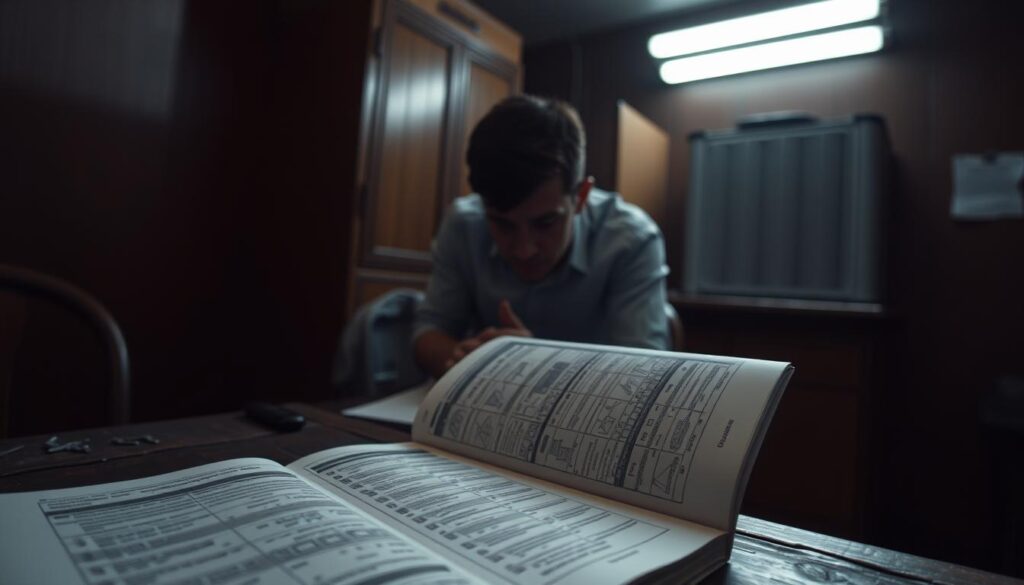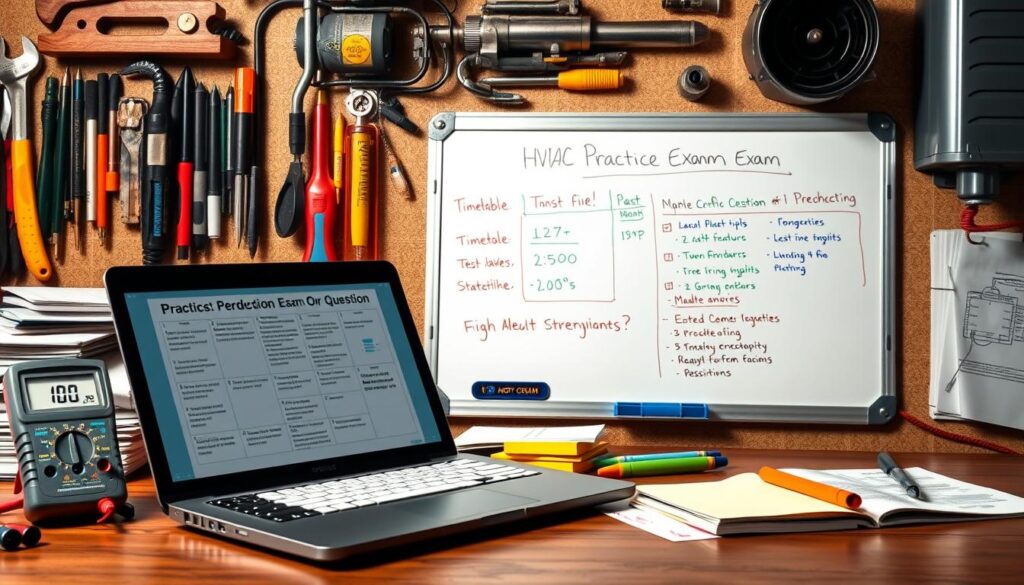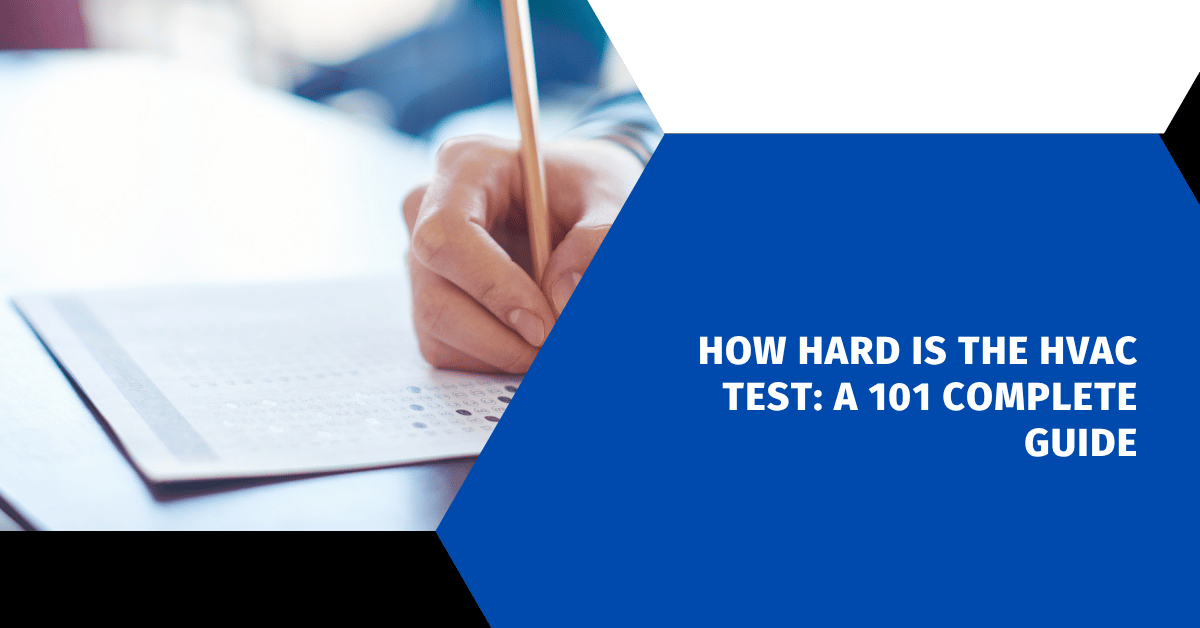Affiliate Disclosure
HVAC Guide Guys is a participant in the Amazon Services LLC Associates Program, an affiliate advertising program designed to provide a means for sites to earn advertising fees by advertising and linking to Amazon.
How Hard Is the HVAC Test? Are you ready to unlock the secrets of becoming a certified HVAC professional? What really separates successful technicians from those who struggle to pass the certification exam?

The HVAC certification exam is a big step for aspiring technicians. It’s not just about knowing the technical stuff. You also need to understand industry standards well.
Getting certified is more than just passing a test. It’s about showing you’re an expert in a complex field. Many states need specific licenses. To become a professional HVAC technician, you’ll face tough tests and lots of practical experience.
If you want to start or grow your HVAC career, knowing how hard the test is is key. This guide will cover everything about HVAC certification exams.
Key Takeaways
- HVAC certification requires extensive technical knowledge and practical skills
- Exam difficulty varies by state and certification level
- Most exams require a minimum 70% passing score
- Practical experience is key for exam success
- Multiple certification paths exist for different specialties
- Proper preparation can significantly improve exam performance
Table of Contents
Understanding HVAC Certification and Licensing Requirements
Getting into HVAC certification can be tricky. To become a pro HVAC tech, you need to know about different licenses and certifications. These vary by state and area.
To get your HVAC license, you’ll go through several steps. Each state has its own rules you must follow.
State-Specific Licensing Requirements
Licenses for HVAC techs change a lot from state to state. For instance:
- Oregon and Alaska need different licenses for homes and businesses
- Some places require you to have a certain amount of work experience before the test
- Experience needed ranges from 18 months to 4 years, depending on where you are
Different Types of HVAC Licenses
The HVAC field has many licenses to help you grow:
- Apprentice License
- Journeyman License
- Master Technician License
- Contractor License
EPA Certification Requirements
The Environmental Protection Agency (EPA) has rules for HVAC techs working with refrigerants. To do this legally, you must:
- Get formal training
- Pass a big certification test
- Get the right credentials for working with refrigerated systems
“Proper certification is not just a legal requirement, but a mark of professional competence in the HVAC industry.”
Knowing these rules will help you move forward in your HVAC career. It ensures you meet all the professional standards needed.
Explore Our HVAC Shop
Looking for top-rated HVAC tools, parts, and accessories? Visit our shop and find the perfect solution for your needs.
Visit the ShopHow Hard Is the HVAC Test: Breaking Down the Challenge
Understanding the HVAC test can seem like a puzzle. It’s not the same for everyone. The test’s difficulty depends on several important factors.
Several things affect how hard the HVAC test is:
- Test provider requirements
- Geographic location regulations
- Specific HVAC specialty
- Licensing level (journeyman, master, or contractor)
Different levels of certification mean different challenges. For example, a journeyman exam tests basic skills. But, a master-level test requires deep technical knowledge and problem-solving skills.
“Success in HVAC certification is about understanding depth, not just memorizing facts.”
Exam difficulty changes with each testing organization. The NATE Core & Specialty Tests, for example, have 50 questions to be answered in 90 minutes. You need focused preparation and technical skills for this.
| Certification Level | Exam Questions | Time Limit | Difficulty Perception |
|---|---|---|---|
| Journeyman | 50-75 | 90-120 minutes | Moderate |
| Master | 100-150 | 180-240 minutes | High |
| Contractor | 150-200 | 240-300 minutes | Very High |
Getting ready for the HVAC test is essential. Your success comes from knowing theory, having practical experience, and using smart study methods.
Explore Our HVAC Shop
Looking for top-rated HVAC tools, parts, and accessories? Visit our shop and find the perfect solution for your needs.
Visit the ShopMajor HVAC Testing Organizations and Their Exams
Getting into HVAC certification can be tough. Knowing the main testing groups helps you pick the right path for your career.
The HVAC field has many certification paths through respected groups. Each offers special chances for growing your skills and career.
North American Technician Excellence (NATE)
NATE is a top name in HVAC certification. Their tests check your skills in many areas.
- Offers both entry-level and senior-level exams
- Covers multiple HVAC specialties
- Widely recognized by employers nationwide
Getting NATE certified shows you’re skilled and serious about your career. The tests cover:
- Installation techniques
- Service procedures
- System diagnostics
HVAC Excellence
HVAC Excellence is another key player in HVAC certification. They offer tough professional-level certifications for those with lots of field experience.
| Certification Level | Experience Required | Exam Type |
|---|---|---|
| Professional | 2+ Years | Closed Book Exam |
| Entry Level | 0-1 Years | Multiple Choice |
Refrigeration Service Engineers Society
The Refrigeration Service Engineers Society offers special certifications in refrigeration and advanced HVAC. Their tests test your deep technical knowledge.
“Certification is not just a piece of paper, it’s proof of your commitment to excellence in the HVAC industry.”
Learning about these groups helps you plan your career. You can pick the certification that fits your goals.
Explore Our HVAC Shop
Looking for top-rated HVAC tools, parts, and accessories? Visit our shop and find the perfect solution for your needs.
Visit the ShopCore Components of HVAC Certification Exams
Understanding the core parts of HVAC certification exams is key. These tests check your technical knowledge and skills in HVAC.
The typical HVAC technician licensing test covers several important areas:
- Multiple-choice question formats
- Time-limited examination periods
- Comprehensive technical knowledge evaluation
- Practical application scenarios
HVAC certification exams usually have 50 to 100 questions. Most tests give you two hours to finish. They check your knowledge in main technical areas:
| Exam Component | Focus Area | Typical Weight |
|---|---|---|
| Electrical Systems | Circuit theory, wiring, control systems | 25-30% |
| Refrigeration Principles | Thermodynamics, refrigerant handling | 20-25% |
| Safety Protocols | EPA regulations, workplace safety | 15-20% |
| System Design | Equipment selection, load calculations | 20-25% |
Pro tip: Focus your study efforts on understanding both theoretical concepts and practical applications to maximize your exam success.
“Success in HVAC certification is about demonstrating complete technical competence.” – HVAC Industry Expert
Groups like NATE, HVAC Excellence, and EPA Section 608 offer tough exams. They test your real-world HVAC skills. Your prep should mix theory and hands-on practice.
Essential Study Resources and Materials
Getting ready for your HVAC licensing exam needs a smart plan for study materials. Good hvac licensing exam study guides can really help you prepare and succeed.
Your study kit should have a variety of resources to help you learn better. Here are some important materials to think about:
Recommended Textbooks and Guides
- The Engineering Pro Guides HVAC & Refrigeration Technical Study Guide
- HVAC Technical Manual from Delmar Cengage Learning
- Mike Holt’s HVAC Electrical Study Guide
Online Study Tools
Digital tools have changed how we learn for hvac tests, making it more interactive. Check out these online platforms:
- Interplay Learning – Virtual HVAC training simulator
- YouTube technical tutorial channels
- HVAC-specific online practice modules
Practice Exam Resources
Practicing like you’re in the real exam helps build confidence and spots where you need to improve. Here are some good practice exam resources:
- NATE certification practice tests
- EPA Section 608 mock exams
- Industry-specific online practice question banks
*”The key to exam success is not just studying, but studying smart.”*
Creating a study plan that uses many resources will boost your prep. Make sure to set aside time for studying, use different media, and focus on practical skills, not just memorizing.
Time Management and Test-Taking Strategies

Learning hvac test tips and strategies is key to passing your HVAC certification exam. The exam can seem tough, but with the right plan, you can feel more confident and do better.
“Preparation is the key to conquering any challenging exam”
Smart time management begins with knowing the exam layout. Here are important strategies to help you do well on the test:
- Review the exam format before test day
- Practice switching between different subject areas
- Allocate specific time for each exam section
- Focus on your strongest areas first
The best way to take the test is to prepare smartly. Make a study plan that lets you:
- Create detailed study notes
- Take many practice exams
- Keep reviewing tough technical areas
- Get enough sleep before the exam
| Preparation Strategy | Expected Outcome |
|---|---|
| Daily subject rotation | Improved information retention |
| Practice exam repetition | Increased test confidence |
| Comprehensive note review | Better understanding of key concepts |
Pro tip: Regular study of vocational training materials proves more effective than last-minute cramming.
Success in your HVAC certification exam comes from consistent prep, smart time use, and staying calm and focused during the test.
Explore Our HVAC Shop
Looking for top-rated HVAC tools, parts, and accessories? Visit our shop and find the perfect solution for your needs.
Visit the ShopCommon Technical Areas Covered in HVAC Tests
To pass your hvac technician licensing test, you need to know a lot about important technical areas. The test gets harder as you learn more complex technical stuff. You must understand key areas that the exam often covers.
There are main technical areas that you must know well. These areas cover different systems and how they work. To pass your exam, you need to show you know these areas well.
Electrical Systems and Theory
Knowing about electrical systems is key for HVAC tests. You’ll learn about:
- Electrical circuit basics
- How to read wiring diagrams
- Electrical safety rules
- How to measure voltage and current
Refrigeration Principles
Refrigeration is very detailed. You’ll study:
- How refrigerant cycles work
- Compression and expansion
- How heat moves
- Rules for handling refrigerants
Heat Pump Systems
Heat pumps need a deep understanding of:
- How they work in reverse
- How to calculate energy use
- Ways to make them more efficient
- How different parts work together
“Mastering these technical areas is your pathway to HVAC certification success.” – HVAC Industry Expert
| Technical Area | Key Skills Tested | Complexity Level |
|---|---|---|
| Electrical Systems | Circuit Analysis | High |
| Refrigeration | Thermal Dynamics | Intermediate |
| Heat Pump Systems | Energy Efficiency | Intermediate |
Focus on these technical areas when you study. Make sure you understand them well to do well on your HVAC certification test.
Preparing for the EPA Section 608 Certification
The EPA Section 608 Certification is key for HVAC techs working with refrigerants. Knowing the hvac epa certification requirements is vital for those in the HVAC field who work with refrigeration systems.
Getting certified means you’ll need to pass four different tests:
- Type I: Small appliances
- Type II: High-pressure appliances
- Type III: Low-pressure appliances
- Universal: Covers all refrigeration systems
The difficulty of the hvac certification exam depends on the type you choose. Each test has 25 questions. You need to get 70% or more to pass, which is 18 out of 25 correct answers.
“Preparation is key to successfully obtaining your EPA Section 608 Certification.”
To do well, follow these steps:
- Use official study guides
- Practice with sample tests
- Learn about environmental laws
- Know how to handle refrigerants
Pro tip: The Core section is a must for all certifications. It teaches the basics of refrigerant management and protecting the environment.
Remember, not following the rules can lead to big fines. Up to $27,500 a day for breaking the law. Spending time to prepare well will help you pass the test. It also makes sure you’re a responsible HVAC pro.
Real Experience vs. Book Knowledge: What Matters More
When getting ready for the hvac technician licensing test, it’s key to find the right mix of practical experience and book smarts. The HVAC certification exam is not just about remembering what you read. It’s about using real-world skills.

Many in the HVAC field wonder what’s the best way to get ahead. Book knowledge is important, but field experience brings unique insights that books can’t match.
Field Experience Benefits
- Develops intuitive problem-solving skills
- Provides practical understanding of complex systems
- Builds muscle memory for technical procedures
- Enhances diagnostic capabilities
“Real-world application is critical for succeeding in certification processes.” – Industry Professional
Classroom Learning Advantages
- Comprehensive theoretical knowledge
- Understanding latest industry standards
- Structured learning approach
- Access to expert instructors
Many HVAC pros suggest a hybrid approach. Mix classroom learning with hands-on apprenticeships. This combo can really help you pass the test and build a strong career.
Studies show that mixing classroom learning with real-world experience helps you do better on certification exams. For example, NATE certification requires passing core exams. Pass rates vary from 70-78%, depending on how well you prepare.
Explore Our HVAC Shop
Looking for top-rated HVAC tools, parts, and accessories? Visit our shop and find the perfect solution for your needs.
Visit the ShopMost Challenging Aspects of HVAC Testing
Understanding the HVAC certification exam’s tough spots is key. Many find the journeyman test very hard, with a few areas being the biggest hurdles.
The main challenges in HVAC testing are:
- Complex technical calculations
- Detailed troubleshooting scenarios
- Multi-concept application questions
- Ambiguous test wording
Experienced technicians say the HVAC journeyman test challenges come from needing deep technical knowledge. They find airflow calculations using the sensible heat formula very hard. Many struggle to show they really get it.
“Passing these exams isn’t just about memorization—it’s about applying complex technical knowledge in practical scenarios.”
Looking at the stats, we see interesting trends in how people do on the test:
| Study Hours | Pass Rate |
|---|---|
| Less than 100 hours | 53-75% |
| 100-200 hours | 83-95% |
| 200-300 hours | 90-94% |
Important lesson: Good prep boosts your chances of passing the HVAC certification exam difficulty. Spend time learning technical stuff, practicing math, and improving your problem-solving skills.
Career Advancement Through HVAC Certifications
Planning your HVAC career needs strategy and constant skill growth. The hvac technician licensing test might look tough, but it unlocks many career paths.
Certifications are key to your career growth. The hvac certification renewal process keeps you up-to-date with industry standards and new tech. Here are ways to make the most of your certifications:
- Pursue detailed certification programs
- Go for well-known credentials like NATE
- Keep updating your technical skills
Different certification levels can greatly affect your career path:
- Entry-Level Certifications: Show you’re good at the basics
- Advanced Specialization: Highlight your skills in certain HVAC systems
- Universal Certifications: Boost your job market chances
“In the HVAC industry, your credentials are your professional passport.” – HVAC Industry Expert
Certification programs usually last from 6 months to 2 years. Spending time on professional growth can really boost your earnings and job chances.
Remember, certifications are more than just papers. They show your dedication to being the best, your technical skills, and your ongoing learning in the HVAC world.
Conclusion
Getting ready for the HVAC certification exam takes hard work and focus. To become a pro HVAC tech, you need to learn a lot, get hands-on experience, and pass tough tests. How tough the HVAC test is depends on how much you study and practice.
Your success in HVAC certification comes from good prep and real-world experience. HVAC techs can earn between $30,610 and $80,820 a year. This means your hard work can pay off big time. The whole process can take from 6 months to 3 years, needing you to keep learning and trying hard.
The HVAC world has its challenges but also great job chances. You’ll face tests on your skills and knowledge, like EPA and NATE exams. Knowing what’s needed, like scoring well on exams and getting enough training, will help you succeed.
By always learning and keeping up with new trends, you can turn the HVAC exam into a big achievement. Your hard work will open doors to many career chances in a field that’s growing fast and pays well.

